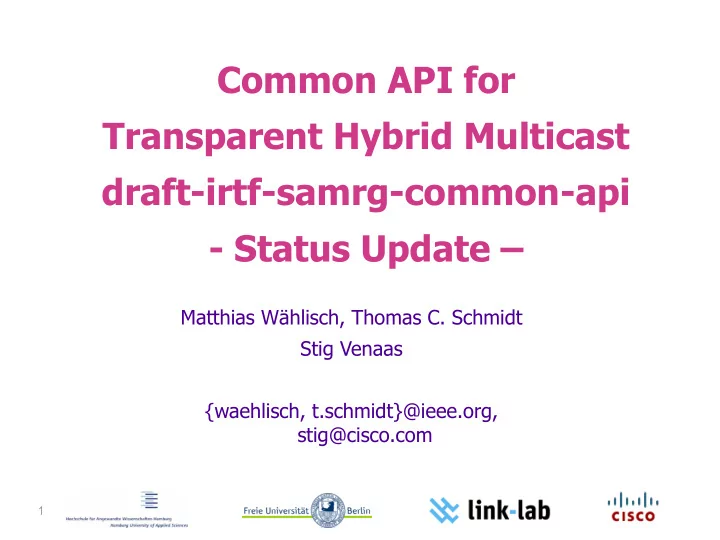

Common API for Transparent Hybrid Multicast draft-irtf-samrg-common-api - Status Update – Matthias Wählisch, Thomas C. Schmidt Stig Venaas {waehlisch, t.schmidt}@ieee.org, stig@cisco.com 1
History of the Draft o Version 00/01 presented at IETF 76, Hiroshima o Adopted as WG document @ Beijing o Update version 05 submitted January 2011 o Update version 06 submitted March 2011 o First WG draft March 2011: draft-irtf-samrg-common-api o Update version 01 submitted March 2011 - Presented @ IETF 80 Prague o Update version 01 (shortly before IETF 81) and version 02 (during IETF 81) July 2011 2
Status of the Draft: Overview Changes from last presentation o Added use case of multicast flavor support o Restructured Section 3 o Major update on namespace and mapping o Pseudo Syntax for lists objects changed o C signatures completed o Many clarifications and editorial improvements 3
Use Case of Multicast Flavor Support o URI scheme uniformly supports different flavors of group communication independent of service deployment ASM, SSM, selective broadcast etc. - Example SSM: o Multicast name: sip://new@cnn.com o Mapping according to one of the following mechanisms: Direct mapping to (S,G) on the IP layer 1. Resolve first S for subsequent group address query 2. Apply overlay mechanisms 3. Delegating to a plain replication server (S) 4. 4
Major Update on Naming o “Functional Details/Namespaces” (Section 5) integrated into “Overview” (Section 3) o Remember: Namespaces are expressed by the scheme field (e.g., sip://…) New: o Namespaces are grouped - Generic namespaces (IP, SHA-2, Opaque) o OLM replaced by SHA-2 - Application-centric namespaces (SIP, RELOAD) 5
Major Update on Mapping New subsections: Canonical Mapping (default mapping) 1. ip://224.1.2.3:5000 mapped to ASM 224.1.2.3/ff0e::224.1.2.3 - Bound to technology, not always applicable - Mapping at End Points 2. Mcast members require Name-to-Address conversion - End points may learn Group Address by neighboring nodes - If learnt, end points can autonomously invert the mapping - Mapping at Interdomain Multicast Gateways 3. IMG is required to re-address packets for another technology - Consequence: IMG needs to know Group Name - 6
Update Pseudo Syntax for List Objects o List of elements is denoted by <> - Example: out Interface <ifs> o Previous description used explicit parameter to express size of the list - out int numIfs, out Interface <ifs> o Now: Syntax assumes that list includes an attribute that represents the number of elements o Reason: Improved readability 7
… Apropos Readability – Any Opinions? There is one open question: Should we include error values in the pseudo syntax? Yes – Pro: o Minimal error behavior defined Yes – Con: o Reduced readability o Abstract API description does not require such details 8
Clarifications – Port & Group Name o Group Name consists of scheme "://" group "@" instantiation ":" port - instantiation and port are optional o Port must be part of the Group Name - Distinguishes groups in direct mapping 9
Thank you … o Please, read the current version o We intend to finalize the draft o More feedback is needed by RG members! 10
Recommend
More recommend